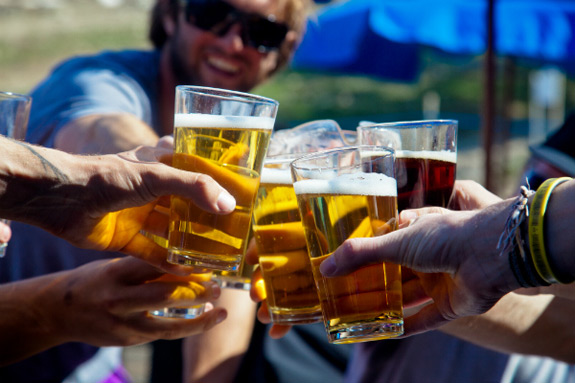Bratislava Bans Open Air Drinking

Starting from July 15th, be careful while drinking in the summer sun in Bratislava, as it will now be illegal to consume alcohol in various public spaces, owing to an amendment to the respective bylaw.
The change passed by city councillors specifies a total of 107 locations where alcohol consumption is prohibited and includes popular spots like the park Sada Janka Krala or Kuchajda lake, or in front of railway and bus stations, shopping centres, supermarkets, bus stops, petrol stations and so on. Those not adhering to the new law will be punished with a fine amounting to 33 euros.
To date, it has already been prohibited to drink alcohol near schools, cemeteries, medical facilities, churches, children’s playgrounds and other sensitive areas. Naturally, the prohibition does not apply to officially organized events, such as open-air markets (like the Christmas market) and in beer gardens of licensed restaurants and bars. The councillor Jozef Uhler pointed out that the change is discriminatory in favour of the city.
Unfortunately the golden era of Bratislava has run its course, and the days of 40p pints in central Bratislava are history. The prices of alcohol have gone up, and various public incidents turned many locals hostile. When you hear Bratislava stag operators praising the city, be careful: even a relatively calm group will have a hard time getting into many bars and clubs. Alcohol is also much cheaper in some places but there is a growing number of places with Western prices and subpar service.
Not only tourists themselves, but also residents of some towns and villages arenow forced to guzzle shots of slivovica in the privacy of their homes, since Slovakia’s municipalities are allowed to ban alcohol consumption in public places. Under the previous law, municipalities could ban public consumption or sale of alcohol only for a couple of hours during the day, the SITA newswire reported, while the current law allows municipalities to institute day-long bans on drinking in public.
“The possibility for a village or a city to create an image as a place which is not friendly towards vices like drinking alcohol in public places is the right move,” said the Association of Towns and Villages of Slovakia (ZMOS) in a release, while welcoming the legislative change happened in the middle of July by MPs from the ruling Smer.
The experiences of foreign countries, however, show that while the ban may prevent people from drinking in public spaces, it could simply compel them to go elsewhere and drink even more, the head of the World Health Organisation (WHO) Country Office in Slovakia, Darina Sedláková, told The Slovak Spectator. She pointed out that alcoholic beverages remain accessible and easy to buy for all social and age groups.
"The most important thing is to educate and inform people about the effects of alcohol, and that excessive alcohol consumption is not only damaging to one’s health, but has undesirable social and public consequences" Sedláková said.
As almost all of us know, Bratislava takes the art of beer-making very seriously. And, in recent years, an exciting new trend has developed: microbreweries. Popping up in unexplored crevices of the city, these tucked-away drinking caves specialise in home-produced lagers, and are packed full of discerning but guzzling locals, who've grown tired of the mass-produced fare. So we hope this law will not affect these little spaces that have not the possibility to take all the clients inside.
 GunMates.eu
GunMates.eu
 PAKTA STUDIO
PAKTA STUDIO